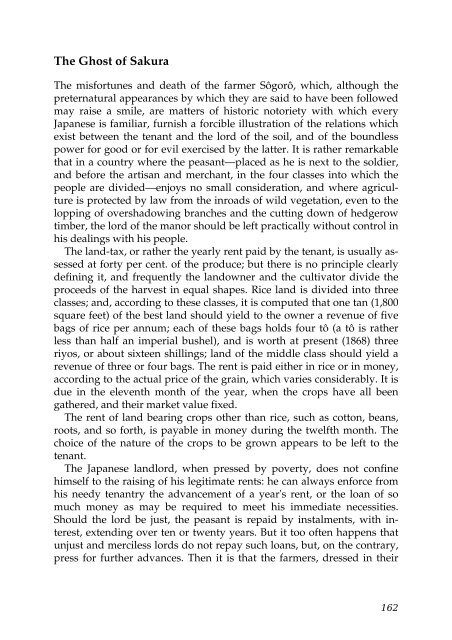You also want an ePaper? Increase the reach of your titles
YUMPU automatically turns print PDFs into web optimized ePapers that Google loves.
The Ghost <strong>of</strong> Sakura<br />
The misfortunes and death <strong>of</strong> the farmer Sôgorô, which, although the<br />
preternatural appearances by which they are said to have been followed<br />
may raise a smile, are matters <strong>of</strong> historic notoriety with which every<br />
<strong>Japan</strong>ese is familiar, furnish a forcible illustration <strong>of</strong> the relations which<br />
exist between the tenant and the lord <strong>of</strong> the soil, and <strong>of</strong> the boundless<br />
power for good or for evil exercised by the latter. <strong>It</strong> is rather remarkable<br />
that in a country where the peasant—placed as he is next to the soldier,<br />
and before the artisan and merchant, in the four classes into which the<br />
people are divided—enjoys no small consideration, and where agriculture<br />
is protected by law from the inroads <strong>of</strong> wild vegetation, even to the<br />
lopping <strong>of</strong> overshadowing branches and the cutting down <strong>of</strong> hedgerow<br />
timber, the lord <strong>of</strong> the manor should be left practically without control in<br />
his dealings with his people.<br />
The land-tax, or rather the yearly rent paid by the tenant, is usually assessed<br />
at forty per cent. <strong>of</strong> the produce; but there is no principle clearly<br />
defining it, and frequently the landowner and the cultivator divide the<br />
proceeds <strong>of</strong> the harvest in equal shapes. Rice land is divided into three<br />
classes; and, according to these classes, it is computed that one tan (1,800<br />
square feet) <strong>of</strong> the best land should yield to the owner a revenue <strong>of</strong> five<br />
bags <strong>of</strong> rice per annum; each <strong>of</strong> these bags holds four tô (a tô is rather<br />
less than half an imperial bushel), and is worth at present (1868) three<br />
riyos, or about sixteen shillings; land <strong>of</strong> the middle class should yield a<br />
revenue <strong>of</strong> three or four bags. The rent is paid either in rice or in money,<br />
according to the actual price <strong>of</strong> the grain, which varies considerably. <strong>It</strong> is<br />
due in the eleventh month <strong>of</strong> the year, when the crops have all been<br />
gathered, and their market value fixed.<br />
The rent <strong>of</strong> land bearing crops other than rice, such as cotton, beans,<br />
roots, and so forth, is payable in money during the twelfth month. The<br />
choice <strong>of</strong> the nature <strong>of</strong> the crops to be grown appears to be left to the<br />
tenant.<br />
The <strong>Japan</strong>ese landlord, when pressed by poverty, does not confine<br />
himself to the raising <strong>of</strong> his legitimate rents: he can always enforce from<br />
his needy tenantry the advancement <strong>of</strong> a year's rent, or the loan <strong>of</strong> so<br />
much money as may be required to meet his immediate necessities.<br />
Should the lord be just, the peasant is repaid by instalments, with interest,<br />
extending over ten or twenty years. But it too <strong>of</strong>ten happens that<br />
unjust and merciless lords do not repay such loans, but, on the contrary,<br />
press for further advances. Then it is that the farmers, dressed in their<br />
162



